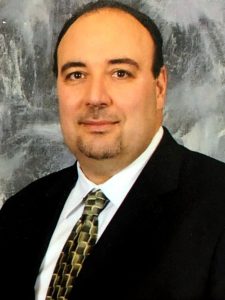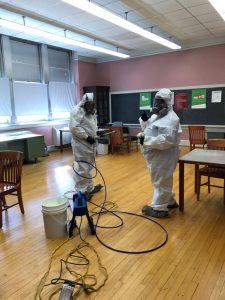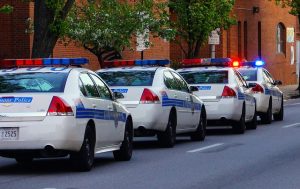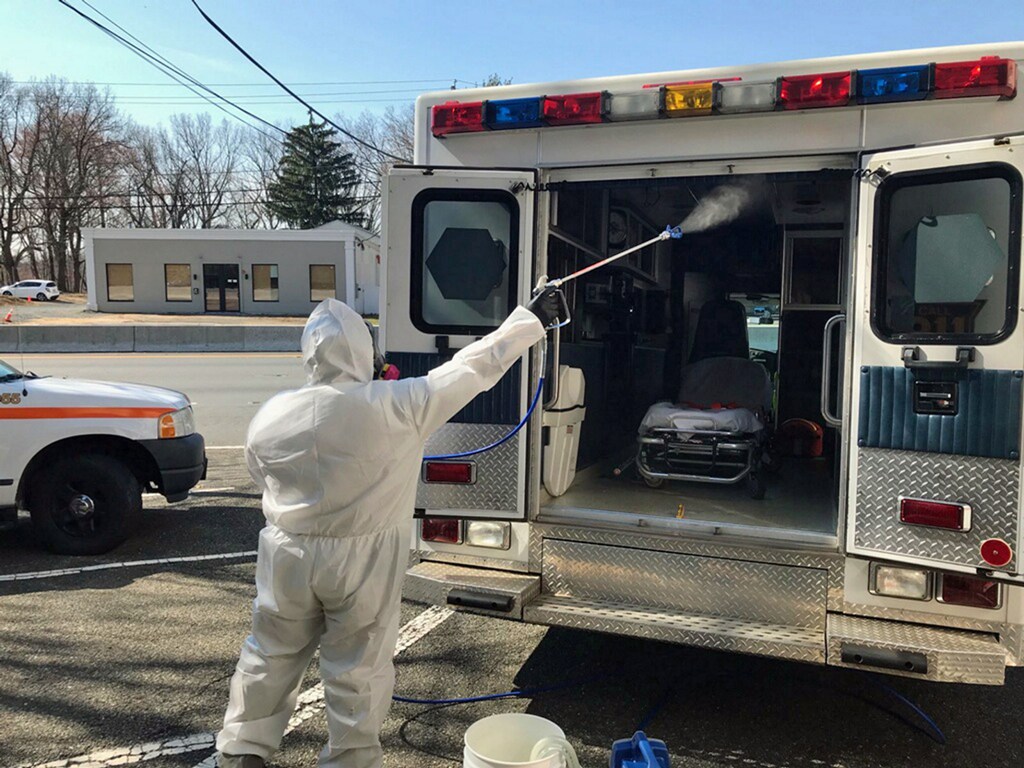Disaster Recovery Firm Launches Coronavirus Disinfection Division
A service technician from Delaware-based National Restoration applies a disinfecting spray fog to the interior of an ambulance. National Restoration has launched a dedicated Coronavirus Disinfection Division. (courtesy)
Wilmington, DE — Hand washing, disinfecting, and social distancing have become mantras across most of America. But aside from sheltering in place with whatever supplies we already have, there is only so much we can do as individuals to battle a global pandemic. At some point, pros from specialized fields have to enter the mix. To understand the way professional cleaning contractors figure into flattening the curve in the spread of COVID-19, we spoke with John Marroni of National Restoration. Effective this week, National Restoration has launched a newly dedicated Coronavirus Disinfection Division.
BPE: Thank you for taking a few minutes to speak with us at what must be a very busy time in your day. I received an interesting press release this morning and wanted to ask about your offer to clean police cars and ambulances for free, but there’s more to this pandemic than meets the eye.
Marroni: That’s a good way to put it. There is so much uncertainty about what’s really happening now. That’s the biggest thing because what we’re fighting is invisible. I try to emphasize that with my employees. When we are doing fire restoration or mold remediation or sewage cleanup, everything on the job is visible. With this, you have to treat every call we go out on as if the virus is present because you just don’t know. We just take all of the proper precautions and make sure we do a thorough job.
BPE: I’ve seen photos of technicians elsewhere entering buildings with ultraviolet lights. Is that a way to attack the virus or are they just looking for something in particular?

Marroni: A lot of time, with ultraviolet light, you can see bacteria. Of course, bacteria and viruses are two different things, so I’m not sure that you can detect a virus with ultraviolet light.
BPE: You’ve just announced that you are launching a newly dedicated Coronavirus Disinfection Division. Please tell us a bit about that effort and how it relates to your restoration business?
Marroni: Our business is primarily fire, smoke, water, and mold. We also do asbestos removal, along with crime scenes and bodily fluids, such as in clean-ups for suicides and natural deaths, where a body may have laid undiscovered for a few days.
The concern with coronavirus is that people just don’t know if their office, their building or their business has it. People using our service are taking the precaution to address potential problems.
Some of the calls we are getting stem from cases where someone on the premises has contracted coronavirus. Owners are asking us to come in and clean their entire building.
Because our people are trained in the use of personal protective equipment (PPE), they already know how to protect themselves; how to go into a facility and deal with an assortment of difficult assignments. Coronavirus is different, again, in the respect that it is not visible. But we feel – given our equipment and our training – we are poised to deal with the cleaning phase of the problem. We’re trying to help our country get ahead of the curve.
BPE: And that includes your offer to help first-responders?
Marroni: Yes. This afternoon, after finishing up a total building clean up, I called around to some local ambulance companies, and we went to several locations and disinfected their ambulances for free. These providers are running out of face masks and disinfectant, so we’re doing anything we can do to help them keep ahead of this thing.
BPE: You’re New Jersey-based?
Marroni: No, we got started in New Jersey, but we’re now headquartered in Wilmington, Delaware. We normally cover from New York to Baltimore, but we are licensed in a number of states. Baltimore is only an hour and a half away from Wilmington, so that’s an easy drive for us. We’ve gotten some calls from down there, simply asking, “If we need you, can you do it?” Our answer is always yes.
We’ll go when and wherever we are needed. I was in Puerto Rico after the hurricane and did some facilities down there. I was also in Dallas, Texas – we do work in multiple states.

BPE: Not just the Mid-Atlantic?
Marroni: Well, I sent a crew to Pittsburgh last Wednesday. That’s about a six-hour drive. That customer, by the way, also has facilities in Baltimore. They have 109 locations just here on the east coast, and while they have not seen a confirmed case of coronavirus, they are being extremely careful, for the sake of their employees.
BPE: You’ve been in business for 23 years?
Marroni: Yes
BPE: May I ask how many employees you have?
Marroni: Right now, we’re running with 36 people. The projects we are currently doing only take a team of 5-6 guys. They’re very efficient. A 25,000 square foot office building takes us about 4-5 hours.
BPE: Please tell us about the disinfection process.
Marroni: There are two methods. One is to use sprayers in high volume. The other is the wipe and spray method. We always recommend the wipe and spray, because we’ll wipe down any highly used component of the building. Door handles, light switches, keyboards, desks, flat surfaces, common areas, restrooms — any area that is used daily will get a thorough cleaning.
Then what we’ll do is what is called a spray fog.
It’s been proven that standard janitorial services are not as effective as using a supplemental spray fog. There are just too many places that can be missed.
BPE: If I understand this correctly, you’re basically atomizing a disinfection product in the same way one might mist a garden?

Marroni: Absolutely.
BPE: What can you tell us about the products you are using?
Marroni: Well, we’ve been using this gentleman’s (Jerry Bond – founder of PreVasive Products) products for a while – especially in dealing with mold. Jerry designed and developed these products, and they are fully tested by the EPA. So, the difference between our process and most is that the disinfectants that a lot of people are using are just that – disinfectants. When we add the NOROxyCdiff to the disinfectant, it becomes a sporicidal. What that really means in our line of work is it’s like using the Air Force One of products. It’s been proven to kill the virus.
The beauty of this method is we mix NOROxyCdiff with PreVasive’s Botanical Antimicrobial Cleaner (BAC). If you read the literature for BAC, you’ll find it can even be used as a vegetable wash – that’s how safe and natural it is.
There is also a residual effect. It’s an oil, but it isn’t oily, so it tends to last on non-friction surfaces for weeks. Because of that, we recommend that our customers allow us to do an initial wipe and spray, and then have us back every couple of weeks to do a spray again until this thing is all clear.
BPE: Is this product safe to use around people with respiratory problems?
Marroni: Absolutely, but we always tell our clients they cannot have people in the building while we are working, and no one should enter the premises for at least half an hour after the job is done.
There are good disinfectants out there – you might recall Microban as one of them – but they are not botanical products and they tend to have a very strong odor. Of course, you have the same problem with hair spray and deodorants. Anytime you mist or fog a space, you need to let things air out.
BPE: A three-fold question: How long does it take to treat a police car or an ambulance? How long before that unit is back in service? And how long does the treatment last?

Marroni: Well, last week I timed myself, and it took me 45 minutes to do 20 cop cars. Officers can get back into the cars and on the road in 10-15 minutes.
Again, you have that residual effect.
They should keep disinfectant wipes on hand for areas like the steering wheels and door handles, but as I said, we are doing this as a courtesy to give first responders an extra measure of protection.
BPE: You are not currently contracted to any particular fire or police departments – you are just providing this as a free service?
Marroni: That’s right. We do have some municipalities in New Jersey that are getting their buildings done once a week. We’re also working in places that are presently unoccupied.
When a building stands stagnant for a time, you don’t know what is growing inside. We really recommend that, before you reoccupy a building that has been sitting static for a couple of weeks, owners do a thorough disinfecting.
BPE: You’ve talked about spraying and wiping visible surfaces. What about treating ventilation (HVAC) systems?
Marroni: What happens there is we have the HVAC systems running while we are spraying. We spray the intakes and the registers. That way, while we are spraying, the product is sucked into the ductwork, works its way throughout the system, and is discharged through the supplies.
BPE: This may be running a bit afield, but what are your thoughts on the possibility that hotels and dorm rooms may be pressed into use as emergency hospitals?
Marroni: Listen, nobody really knows where this thing is going to go. But I think that using hotels and college dorms is going to be much faster than building pop-up facilities. My first recommendation would be to make sure they are clean and sterile before they start using them, and then obviously, while they are in use. Hospitals maintain those kinds of cleaning routines every day. I’d only advise again that standard janitorial cleaning is not as effective as a spray treatment.
This is not to be disrespectful, but janitors just can’t get the coverage.
This is especially important in hotels and dorm rooms because they weren’t designed to house hospital patients.

BPE: So, disinfecting before, during and after?
Marroni: Right! I mean, if your child is a college student, what would be going through your mind if they use his dorm to treat coronavirus patients?
BPE: You mentioned earlier that you currently have 36 employees. Do you see yourself hiring more people to deal with additional contracts?
Marroni: Oh, absolutely. We just don’t know where this thing is going. Keep in mind, when we have a natural disaster, I always bring on additional personnel.
When Pennsylvania had all of that flooding about ten years ago, we needed to have a hundred guys for forty days at King of Prussia Mall. It will just depend on the situation, and as we all know by now, there are a lot of qualified people presently out of work.
We have a guy on staff who is fully FEMA approved, so he runs everyone we hire through a pretty rigorous training.
Our people know what they are doing, and it galls me to see pictures on Facebook of guys in tee-shirts with half-face respirators doing coronavirus cleaning work. You really should be in full body protection equipment from head to toe. That means full face masks, P100 respirators with organic cartridges, Tyvek suits with the booties; your sleeve wrists need to be taped to your gloves. People are just not taking it seriously enough.
BPE: Final question: Who should be placing your number on speed-dial?
Marroni: Property managers, hospital administrators, daycare centers, nursing homes. Any commercial establishment that has a high-risk group. Or one that has a high volume of people, such as a law office, a restaurant or a school. Any place at risk and any place that gets a lot of foot traffic. Even if you have regular janitorial services, you should give us a call. We can demonstrate how much more effective we are for dealing with this pandemic.

Anthony C. Hayes is an actor, author, raconteur, rapscallion and bon vivant. A one-time newsboy for the Evening Sun and professional presence at the Washington Herald, Tony’s poetry, photography, humor, and prose have also been featured in Smile, Hon, You’re in Baltimore!, Destination Maryland, Magic Octopus Magazine, Los Angeles Post-Examiner, Voice of Baltimore, SmartCEO, Alvarez Fiction, and Tales of Blood and Roses. If you notice that his work has been purloined, please let him know. As the Good Book says, “Thou shalt not steal.”

